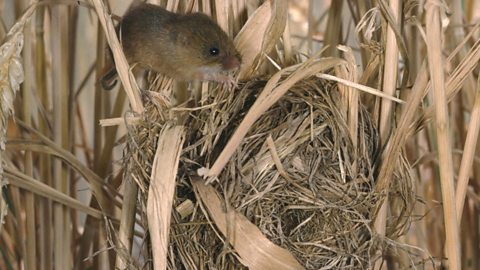Stanzas 1 - 3: Apology and Reassurance
Stanza 1: Tone
The tone in the poemÔÇÖs opening is of gentle reassurance. The speaker addresses the mouse directly, using the child-like diminutives beastie
and breastie
, while attempting to defuse its fears - O, whit a panicÔÇÖs
- and telling it directly it is in no danger.
Word choice like wee
and the onomatopoeiaThe sounds of words to express or underline their meaning, eg 'crunch', 'pop'. of bickerin brattle
emphasise the small-scale nature of what has happened. The mouseÔÇÖs troubles might seem insignificant and temporary. Note also the use of feminine rhymeRhyming which includes an unstressed syllable. This helps a variety of effects and tones, from gentleness to sarcasm. . This device can be put to various uses. Here it conveys gentleness, sustaining the tone of beastie
and breastie
.
Stanza 2: Politics
The speakerÔÇÖs apology for startling the mouse picks up the previous reassuring tone through the words, IÔÇÖm truly sorry
. Although still apparently addressing the mouse, the stanza is more of a reflection on nature and human society. The speaker clearly disapproves of disruption of harmony in nature, caused here by himself, representing humanity. His careless destruction of the nest - showing manÔÇÖs dominion
over nature justifies
the mouseÔÇÖs fear of him.

Note that the expression social union
is also a reference to radical democratic associations that were springing up in the late 18th century, eager for political reform and social justice. This was a time when few people could vote and the poor had very few rights.
This stanza also introduces the note of empathy which will develop later. The shared poverty of man and mouse and of their common roots in the land are summed up in the description of himself as thy poor, earth-born companion
Stanza 3: Justice
The speaker shows that he does not begrudge the mouse a share of the harvest. Although the mouse does thieve
from him, the speaker accepts that survival is more important that social rules about property. The strong monosyllables in thou maun live
emphasise the absolute need for survival. Burns was making a radical point here about the redistribution of human wealth.